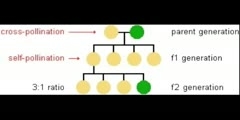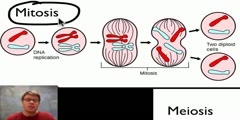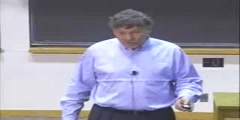Lec 2 - Basic Transmission Genetics
"Lec 2 - Basic Transmission Genetics" Principles of Evolution, Ecology and Behavior (EEB 122) Genetic transmission is the mechanism that drives evolution. DNA encodes all the information necessary to make an organism. Every organism's DNA is made of the same basic parts, arranged in different orders. DNA is divided into chromosomes, or groups of genes, which code for proteins. Asexually reproducing organisms reproduce using mitosis, while sexually reproducing organisms reproduce using meiosis. Both these mechanisms involve duplication of DNA, which then gets passed to offspring. RNA is a key component in the duplication of DNA. 00:00 - Chapter 1. Introduction 01:29 - Chapter 2. Structure of DNA and Genetic Material 12:51 - Chapter 3. DNA Replication and Its Implications 25:56 - Chapter 4. Mendel's Laws 33:08 - Chapter 5. Mutations and Their Consequences Complete course materials are available at the Open Yale Courses website: http://open.yale.edu/courses This course was recorded in Spring 2009.
Video is embedded from external source so embedding is not available.
Video is embedded from external source so download is not available.
Channels: Ecology
Tags: genetics dominance DNA genes protein RNA nucleotides chromosome genotype phenotype diploid haploid codon translation Central Dogma reproduction mitosis meiosis Mendel recombination mutation population
Uploaded by: yaleevoeco ( Send Message ) on 02-09-2012.
Duration: 44m 36s
Here is the next lecture for this course
Lec 9 - Mitosis, Meiosis and Sexual Repro ...
18:23 | 5587 viewsLec 16- Population Genetics I: Mendel, Darw
48:15 | 2288 viewsLec 17- Population Genetics II: Mutation an
46:18 | 2315 viewsAll About Genetics And Population
11:04 | 2765 viewsMendelian Genetics
04:58 | 16992 viewsDescription of unit 5 review genetics
19:41 | 2732 viewsCentral Dogma of Translation
02:27 | 11628 viewsLec 16 - Biology 1B - Population Genetics I
48:13 | 3104 viewsLec 17 - Biology 1B - Population Genetics II
48:55 | 2589 viewsLec 18 - Biology 1B - Population Genetics III
48:16 | 2667 viewsLec 5 - How Selection Changes the Genetic ...
49:31 | 3139 viewsGenomics Lecture MIT
49:06 | 23052 viewsLec 18- Population Genetics III: Natural Se
45:29 | 2169 viewsLec 4 - Molecular Genetics I
01:33:35 | 3703 viewsLec 5 - Molecular Genetics II
01:14:09 | 3316 viewsNo content is added to this lecture.
This video is a part of a lecture series from of Yale
Lecture list for this course
Lec 1 - The Nature of Evolution: Selection, Inheritance, and History
Lec 3 - Adaptive Evolution: Natural Selection
Lec 4 - Neutral Evolution: Genetic Drift
Lec 5 - How Selection Changes the Genetic Composition of Population
Lec 6 - The Origin and Maintenance of Genetic Variation
Lec 7 - The Importance of Development in Evolution
Lec 8 - The Expression of Variation: Reaction Norms
Lec 11 - Life History Evolution
Lec 14 - Species and Speciation
Lec 15 - Phylogeny and Systematics
Lec 16 - Comparative Methods: Trees, Maps, and Traits
Lec 17 - Key Events in Evolution
Lec 18 - Major Events in the Geological Theatre
Lec 19 - The Fossil Record and Life's History
Lec 21 - Evolutionary Medicine
Lec 22 - The Impact of Evolutionary Thought on the Social Sciences
Lec 24 - Climate and the Distribution of Life on Earth
Lec 25 - Interactions with the Physical Environment
Lec 26 - Population Growth: Density Effects
Lec 27 - Interspecific Competition
Lec 28 - Ecological Communities
Lec 29 - Island Biogeography and Invasive Species
Lec 30 - Energy and Matter in Ecosystems
Lec 31 - Why So Many Species? The Factors Affecting Biodiversity
Lec 32 - Economic Decisions for the Foraging Individual
Lec 33 - Evolutionary Game Theory: Fighting and Contests
Lec 34 - Mating Systems and Parental Care
















